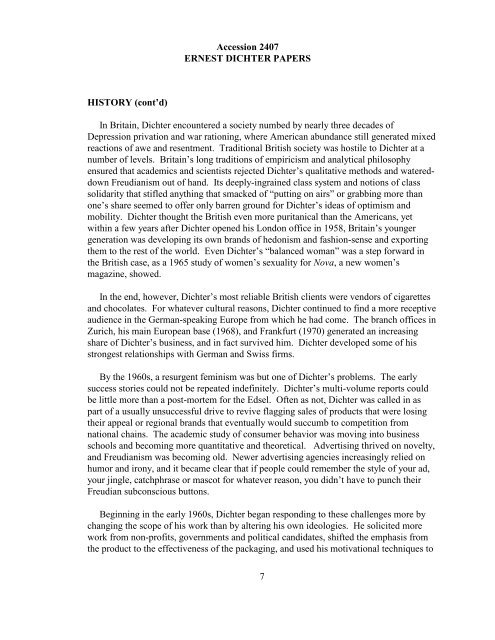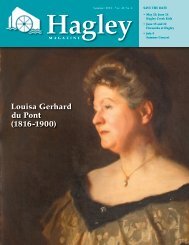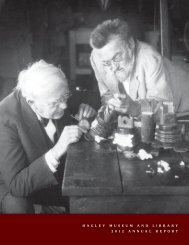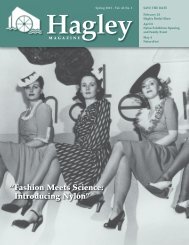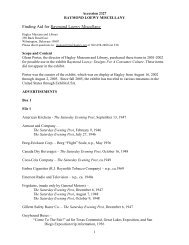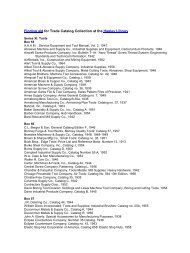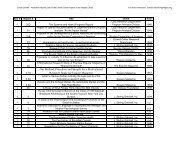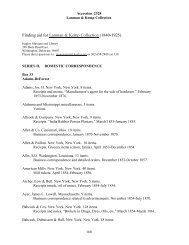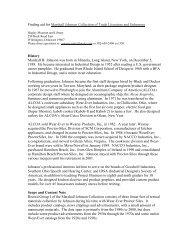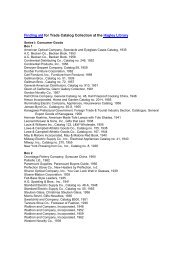Ernest Dichter Papers - Hagley Museum and Library
Ernest Dichter Papers - Hagley Museum and Library
Ernest Dichter Papers - Hagley Museum and Library
You also want an ePaper? Increase the reach of your titles
YUMPU automatically turns print PDFs into web optimized ePapers that Google loves.
HISTORY (cont’d)<br />
Accession 2407<br />
ERNEST DICHTER PAPERS<br />
In Britain, <strong>Dichter</strong> encountered a society numbed by nearly three decades of<br />
Depression privation <strong>and</strong> war rationing, where American abundance still generated mixed<br />
reactions of awe <strong>and</strong> resentment. Traditional British society was hostile to <strong>Dichter</strong> at a<br />
number of levels. Britain’s long traditions of empiricism <strong>and</strong> analytical philosophy<br />
ensured that academics <strong>and</strong> scientists rejected <strong>Dichter</strong>’s qualitative methods <strong>and</strong> watereddown<br />
Freudianism out of h<strong>and</strong>. Its deeply-ingrained class system <strong>and</strong> notions of class<br />
solidarity that stifled anything that smacked of “putting on airs” or grabbing more than<br />
one’s share seemed to offer only barren ground for <strong>Dichter</strong>’s ideas of optimism <strong>and</strong><br />
mobility. <strong>Dichter</strong> thought the British even more puritanical than the Americans, yet<br />
within a few years after <strong>Dichter</strong> opened his London office in 1958, Britain’s younger<br />
generation was developing its own br<strong>and</strong>s of hedonism <strong>and</strong> fashion-sense <strong>and</strong> exporting<br />
them to the rest of the world. Even <strong>Dichter</strong>’s “balanced woman” was a step forward in<br />
the British case, as a 1965 study of women’s sexuality for Nova, a new women’s<br />
magazine, showed.<br />
In the end, however, <strong>Dichter</strong>’s most reliable British clients were vendors of cigarettes<br />
<strong>and</strong> chocolates. For whatever cultural reasons, <strong>Dichter</strong> continued to find a more receptive<br />
audience in the German-speaking Europe from which he had come. The branch offices in<br />
Zurich, his main European base (1968), <strong>and</strong> Frankfurt (1970) generated an increasing<br />
share of <strong>Dichter</strong>’s business, <strong>and</strong> in fact survived him. <strong>Dichter</strong> developed some of his<br />
strongest relationships with German <strong>and</strong> Swiss firms.<br />
By the 1960s, a resurgent feminism was but one of <strong>Dichter</strong>’s problems. The early<br />
success stories could not be repeated indefinitely. <strong>Dichter</strong>’s multi-volume reports could<br />
be little more than a post-mortem for the Edsel. Often as not, <strong>Dichter</strong> was called in as<br />
part of a usually unsuccessful drive to revive flagging sales of products that were losing<br />
their appeal or regional br<strong>and</strong>s that eventually would succumb to competition from<br />
national chains. The academic study of consumer behavior was moving into business<br />
schools <strong>and</strong> becoming more quantitative <strong>and</strong> theoretical. Advertising thrived on novelty,<br />
<strong>and</strong> Freudianism was becoming old. Newer advertising agencies increasingly relied on<br />
humor <strong>and</strong> irony, <strong>and</strong> it became clear that if people could remember the style of your ad,<br />
your jingle, catchphrase or mascot for whatever reason, you didn’t have to punch their<br />
Freudian subconscious buttons.<br />
Beginning in the early 1960s, <strong>Dichter</strong> began responding to these challenges more by<br />
changing the scope of his work than by altering his own ideologies. He solicited more<br />
work from non-profits, governments <strong>and</strong> political c<strong>and</strong>idates, shifted the emphasis from<br />
the product to the effectiveness of the packaging, <strong>and</strong> used his motivational techniques to<br />
7


